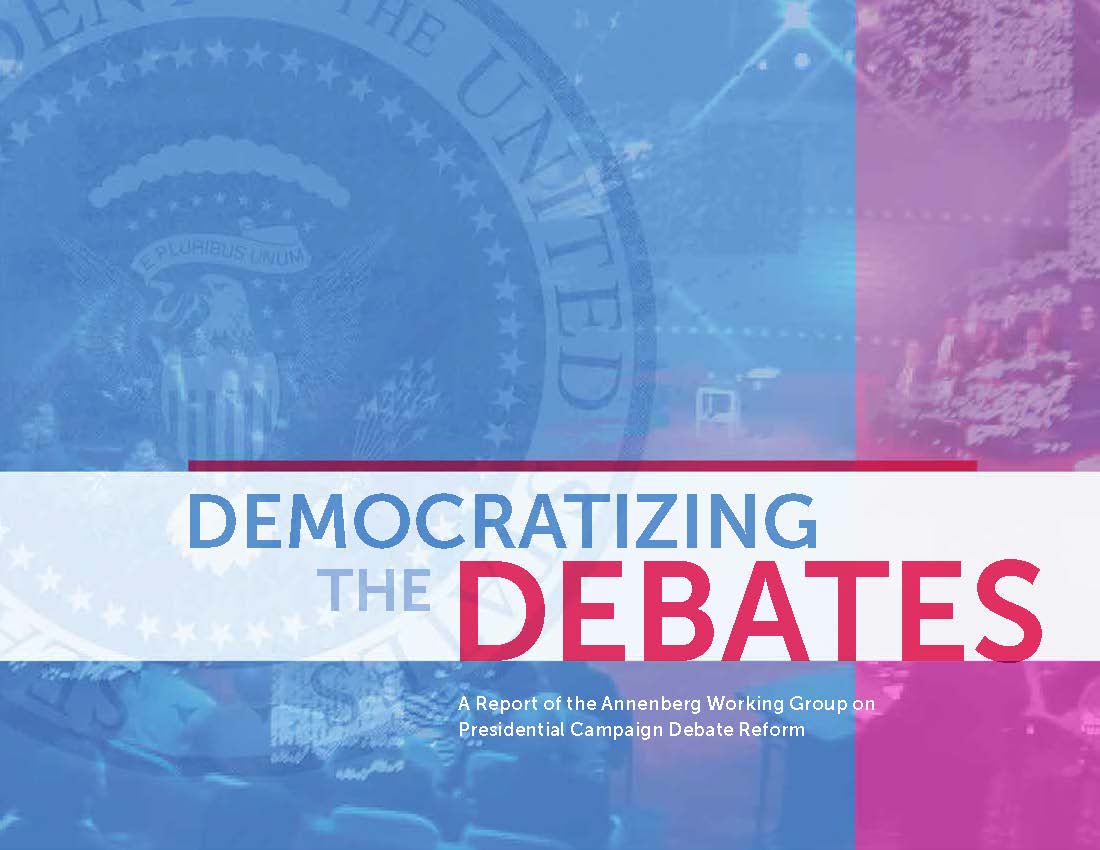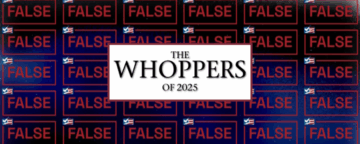Among the recommendations offered by a bipartisan 16-member 2015 Annenberg Debate Reform Working Group were: revising the debate timetable to take into account the rise of early voting; eliminating on-site audiences for debates other than the town hall; and, in the process, reducing the need for major financial sponsors and audiences filled with donors. If current plans are carried out all three will be implemented in the two debates agreed upon by the Trump and Biden campaigns.
The 2015 working group’s report moved into news this week when Frank Fahrenkopf, co-chair of the Commission on Presidential Debates, cited the participation of Biden advisor Anita Dunn in the working group as evidence of Dunn’s hostility to the Commission on Presidential Debates. The attack came after the Trump and Biden presidential campaigns agreed to participate in presidential debates hosted by CNN and ABC News, and in the process, in the words of the Associated Press, “skirted the Commission on Presidential Debates, which has organized the events for 36 years.”
 The Annenberg Debate Reform Working Group was created by the Annenberg Public Policy Center of the University of Pennsylvania to explore ways to increase the value and viewership of presidential general election debates, taking into account the ways in which the rise of early voting, the advent of social media, establishment of new media networks, changes in campaign finance, and the increase in the number of independent voters have altered the electoral environment. It would be difficult to overstate the significance of these changes.
The Annenberg Debate Reform Working Group was created by the Annenberg Public Policy Center of the University of Pennsylvania to explore ways to increase the value and viewership of presidential general election debates, taking into account the ways in which the rise of early voting, the advent of social media, establishment of new media networks, changes in campaign finance, and the increase in the number of independent voters have altered the electoral environment. It would be difficult to overstate the significance of these changes.
In addition to APPC Director Kathleen Hall Jamieson, the working group, chaired by Obama debate advisor Dunn and Romney debate advisor Beth Myers, included 7 Republican and 6 Democratic consultants who had advised presidential candidates about debates: Robert Barnett (D), Bob Bauer (D), Joel Benenson (D), Charles Black (R), Rick Davis (R), Benjamin Ginsberg (R), Ron Klain (D), Neil Newhouse (R), Zac Moffatt (R), Jim Perry (R), Joe Rospars (D), Michael Sheehan (D), and Stuart Stevens (R).
The following working group recommendations were unanimously endorsed by its members:
EXPANDING AND ENRICHING DEBATE CONTENT
- Increase direct candidate exchanges and otherwise enhance the capacity of candidates to engage each other and communicate views and positions;
- Reduce candidate “gaming” of time-limited answers and create opportunities to clarify an exchange or respond to an attack;
- Enlarge the pool of potential moderators to include print journalists, university presidents, retired judges and other experts.
- Use alternate formats for some of the debates, including a chess clock model that gives each candidate an equal amount of time to draw upon.
- Expand the role of diverse media outlets and the public in submitting questions for the debates; and
- Increase the representativeness of audiences and questioners at town hall debates.
BROADENING THE ACCESSIBILITY OF THE DEBATES
- Embrace social media platforms, which are the primary source of political information for a growing number of Americans, and facilitate creative use of debate content by social media platforms as well as by major networks such as Univision, Telemundo, and BET, by providing unimpeded access to an unedited feed from each of the cameras and a role in framing topics and questions; and
- Revise the debate timetable to take into account the rise of early voting.
IMPROVING THE TRANSPARENCY AND ACCOUNTABILITY OF THE DEBATE PROCESS
- Eliminate on-site audiences for debates other than the town hall and, in the process, reduce the need for major financial sponsors and audiences filled with donors;
- Publicly release the Memorandum of Understanding (MOU) governing the debates as soon as it is signed;
- Require the moderators to be signatories to the MOU to ensure compliance with the agreements about rules and formats; and
- Clearly articulate the standards required of polls used to determine eligibility for the debates.


